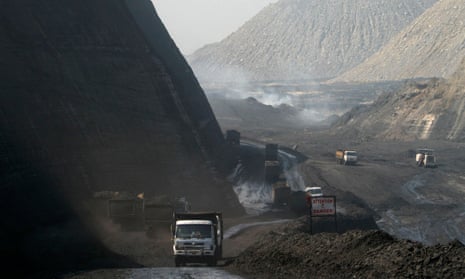The Australian government is being urged to support an end to the financing of fossil fuel projects as the Asian Development Bank prepares to signs off on a new energy policy later this month.
The ADB “will not support coalmining, processing, storage, and transportation, nor any new coal-fired power generation”, according to a draft version of the policy, which also endorses “the early retirement of coal-based power plants”.
The ADB – which offers loans, grants and other assistance to developing countries across the region – has also proposed ending support for “any natural gas exploration or drilling activities”.
Australia – the ADB’s fifth-largest shareholder – is represented on its board, which will consider the policy on 20 October.
Environment and aid groups are among 35 organisations to have written to the treasurer, Josh Frydenberg, to encourage Australia to “use its influence” to support ending “all financing and support of fossil fuels”.
In the letter, published on Wednesday, they argue the move would to help the region “make a just and equitable low-carbon transition”.
The groups – including ActionAid Australia, Jubilee Australia, the Australian Conservation Foundation and Oxfam – say they are “deeply concerned” that Australia may be pushing for the ADB to continue to support coal and gas-related projects.
If Australia continues to support investment in fossil fuel projects, the letter says, it is “undermining the Paris agreement goal of limiting global warming to 1.5C and blocking progress on climate action on the international stage, which is out of step with peer governments”.
“Any infrastructure investment related to coal, oil, and gas locks in long-term financial and environmental destruction.”
Katherine Tu, the head of campaigns and policy at ActionAid Australia, said Australia “should be supporting, not blocking, any positive steps the Asian Development Bank is taking to rule out support for fossil fuels”.
“Globally, governments and institutions are making strong commitments to cease the financing and support of fossil fuel-related projects abroad,” Tu said in a statement.
“The US, UK, and EU have committed to do this. China recently announced it would end support for all new coal projects overseas. The European Investment Bank will also stop funding all coal, oil, and gas projects by the end of 2021. Australia must step up and join this global leadership.”
The calls come amid internal divisions within the Australian government on a long-term emissions reduction strategy to present to the Cop26 climate conference in Glasgow next month.
Frydenberg acknowledged in a speech last month that markets were “moving as governments, regulators, central banks and investors are preparing for a lower emissions future”.
In laying out the economic case for Australia committing to net zero emissions by 2050, Frydenberg said the country “cannot run the risk that markets falsely assume we are not transitioning in line with the rest of the world”.
Treasury officials were asked about the ADB’s proposed new policy on coal, oil and gas projects during Senate estimates hearings in June.
The Greens senator Janet Rice wanted to know what position Australia’s representative had advocated for in ADB board discussions to date.
“The Treasury and Department of Foreign Affairs and Trade regularly meet with the executive and alternate executive directors from the constituency headed by Australia to discuss a range of issues on the work program of the ADB board of directors,” the department said in a written response to those questions.
“The ADB board of directors has not yet had a formal discussion on the draft energy policy paper.”
